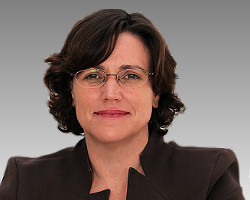|
Gianna Moscardo Professor of Business Studies Personal page |
Gianna Moscardo got her Ph.D at James Cook University where she is a Principal Research Fellow working with a team of researchers in the Tourism Program.
Her main areas of interests concern the human dimensions of wildlife based tourism; nature based tourism; interpretation and information services; marine tourism and recreation; application of psychology to tourism management including studies of tourist behaviour, motivation, attitudes, satisfaction, orientation, and service quality; regional tourism planning and development; tourism impacts and monitoring; community attitudes towards protected area management.
Her researches show that the traditional management strategies that relied on the remoteness to protect the wilderness qualities of some geographical areas are not anymore appropriate since people are able to move faster and easer; luckily there is also a growth in community interest in the natural environment; so operators see the value in providing clients with good interpretation and education as a means of increasing customer satisfaction and thereby increasing their operation's competitiveness. Conversely research indicates that inappropriate staff behaviour, lack of information and transport produces a strong negative response by the tourists: "Today's increasingly demanding and experienced clientele require more unique experiences and opportunities for self development. Education services for visitors, otherwise known as 'interpretation', may play an important role in ensuring tourism operations meet visitor expectations" -Dr. Moscardo writes "Interpretation provided depth to the visitors' experience, helping to achieve high levels of satisfaction. Such an influence is good for business, as satisfied customers will tell their friends and be repeat visitors".
At AILUN Dr. Moscardo presents the main questions raised about how to pursue a sustainable tourism development and how appropriate information system can help to reach this goal.
Some publications
Gianna Moscardo and Philip L. Pearce (under review), Marketing host communities, Chapter in S. Singh, D. Timothy, and R. Dowling, Tourism in destination communities, CABI.
Gianna Moscardo (2002), Don't know, don't care: The importance of information for visitors to the Great Barrier Reef. In E. Laws (Ed) Tourism Marketing, London: Continuum.
Philip L. Pearce and Gianna Moscardo (2002), The Great Barrier Reef Media Monitoring Project Report 5: May-August 2001. Supplementary report on internet users, based on data collected by researchers in CRC Reef Project B2.1.1.
Gianna Moscardo andP. L. Pearce (2002), Marketing host communities. In S. Singh, D. J. Timothy and R. K. Dowling (Eds.), Tourism in Destination Communities, Wallingford, UK: CAB International.
Philip L. Pearce and Gianna Moscardo (2001), "Been already and done it before": Understanding visitors repeating trips to the Great Barrier Reef, In C. Pforr and B. Janeczko (Eds), CAUTHE 2001: Capitalising on Research, Proceedings of the eleventh Australian Tourism and Hospitality Research Conference, 7-10 February 2001 (pp. 268-280), Canberra: University of Canberra.
Gianna Moscardo, Philip L. Pearce and A. Morrison (2001), Evaluating Different Bases for Market Segmentation: A Comparison on Geographic Origin versus Activity Participation for Generating Tourist Market Segments, Journal of Travel & Tourism Marketing, 10(1), 29-49.
Gianna Moscardo (2001), Practising what we preach: What can we learn from tourism research to help us teach tourism managers? In D.V. Canyon, S. McGinty & D. Dixon (Eds.). Tertiary teaching IV: Flexible teaching and learning across the disciplines, Sydney: Craftsmen Products Online Publications.
Gianna Moscardo (2001), Visitor evaluations of built tourist facilities: Pontoons on the Great Barrier Reef, Journal of Tourism Studies, 12 (1), 28-38.
Gianna Moscardo (2001), Chapter 1: Cultural and heritage tourism: The great debates. In B. Faulkner, G. Moscardo & E. Laws (Eds), Tourism in the 21st century: Lessons from experience (pp. 3-16), London: Continuum.
Gianna Moscardo, P. L. Pearce, D. Green and J. T. O'Leary (2001), Understanding coastal and marine tourism demand from three European markets: Implications for the future of ecotourism, Journal of Sustainable Tourism, 9(3), 212-227.
Gianna Moscardo, P. L. Pearce and A. Morrison (2001), Evaluating different bases for market segmentation: A comparison of geographic origin versus activity participation for generating tourist market segments, Journal of Travel and Tourism Marketing, 10(1), 29-50.
Gianna Moscardo, D. Green and T. Greenwood (2001), How great is the Great Barrier Reef? Tourists' knowledge and understanding of the world heritage status of the Great Barrier Reef, Tourism Recreation Research, 26(1), 19-26.
Gianna Moscardo (2000), Understanding wildlife tourism market segments: An Australian marine study, Human Dimensions of Wildlife, 5(2) 36-53.
Gianna Moscardo (1999), Making visitors mindful: Principles for creating sustainable visitor experiences through effective communication, Champaign, Ill.: Sagamore.
Gianna Moscardo (1999), Communicating with two million tourists. A formative evaluation of an interpretive brochure, Journal of Interpretation Research. Special Issue: Interpretation in Australia, 4(1), 21-37.
Gianna Moscardo (1999), Supporting ecologically sustainable tourism on the Great Barrier Reef: The importance of visitor research, In Bureau of Tourism Research, Tourism & Hospitality: Delighting the Senses, 1999, Part One. Proceedings of the Ninth Australian Tourism & Hospitality Research Conference, Council for Australian University Tourism and Hospitality Education (CAUTHE), 10-13 February, Adelaide, South Australia (pp. 236-253). Canberra: Bureau of Tourism Research.
Philip L. Pearce, Gianna Moscardo and G. F. Ross (1996), Tourism community relationships, Oxford: Pergamon Press.

